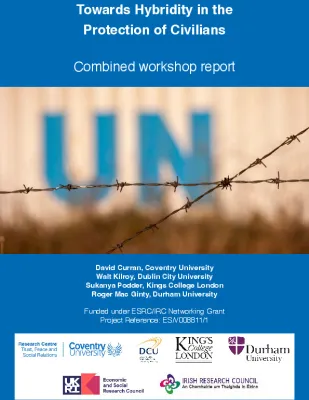Workshop report
ESRC project reference: ES/V00811/1
Violent conflict has a catastrophic effect on all aspects of civilian life. In May 2020, the United Nations Secretary-General reported that more than 20,000 civilians had been killed or injured in 2019 as a result of attacks in conflicts in 10 countries alone. It is for these reasons that the 'protection of civilians' (PoC) in violent conflict zones has become a cornerstone of the policies and actions of those international organisations who intervene in a third-party capacity.
Operations deployed under the United Nations (UN), regional organisations and national governments have all developed policies and frameworks which guide their military, civilian and police personnel in aspects of PoC. Likewise, non-governmental organisations and humanitarian actors have developed their own approaches towards civilian protection, with nuanced but valuable differences from those of the multilateral organisations. In addition, civil society actors from the conflict zone itself approach protection in a way informed by local context. These approaches may also bring a different understanding to what protection is and how it is implemented.
Therefore challenges concerning how different visions of PoC compete and interact within deployment zones have come to the fore. Organisational strategies, governmental approaches, and civil society understandings of what 'protection' means and how it is implemented have been exposed. This necessitates further dialogue amongst the different actors engaged in civilian protection in violent conflict.
This research project will launch a series of workshops whereby policy actors and academic researchers engage on this topic. At the core of these workshops will be the concept of 'hybridity'. A theory drawn from the peacebuilding and development fields, hybridity refers to the interaction between third party interveners, and those who are subject to the intervention. Workshops will examine how intervening organisations have adapted their policies when operating within a shared space with other organisations, and how they react when local actors adapt, ignore, or resist their version of 'civilian protection'.
The workshops will be held in Dublin, London and Durham, and are organised with the intention of linking up an inter-disciplinary network of scholars and policymakers on the topic. Scholars will largely be at the early-career stage of their academic career, and will be invited to present their research into civilian protection, but also to reflect on the research process which they used. The workshops will invite participants from the policy community, engaging with those who develop guidance and policy on civilian protection in an official capacity. Practitioners will be invited to share their perspectives on implementation challenges that they have faced in deployment zones. Here, those who work for humanitarian organisations will outline the processes which took place in engaging with local civil society actors in deployment zones, and how policies were amended in light of local context. Through these workshops it is expected that a sustainable network of engaged parties will be created.
The network will form the core list of authors from which a proposal for a special edition of a high-ranking international journal will be composed. It is expected that academic output will be methodologically rigourous, of high originality and will make a significant contribution to the study of civilian protection in violent conflict.
In addition to the academic output, the workshops will release a number of smaller workshop reports, and a synthesis report. These will be targeted primarily at the policy community to introduce the research project and the discussions which take place. These reports, and background documentation into civilian protection will be stored on a publicly accessible online data-bank. Finally, the series seeks to build a learning pack for students and scholars.
